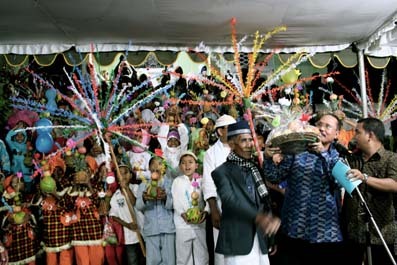After ugly clashes in Sydney and Melbourne between anti-Islam and anti-racism groups, KATHRYN ROBINSON writes that our Indonesian neighbours can teach us about religious tolerance.
The memorial held in our national parliament on 17 July for the people who died in the Malaysian airlines flight MH17 shot down over Ukraine featured a moving rendering by the Australian Girls’ Choir of Australia’s alternative anthem:
We are one but we are many
And from all the lands of earth we come
… We sing with one voice
I am, you are, we are Australian.
As they sang, Australia’s leaders and the families of victims came forward to place sprigs of wattle—the Australian symbol of grieving initiated by former governor-general Sir William Deane, who effectively articulated the Australian psyche, and most notably, its affirming, inclusive and compassionate side.
However, this event was struggling for space in the media alongside stories about public expression of the negative side of our national psyche, in the anti-Muslim Reclaiming Australia rallies held over the weekend.
Deliberately or not, this was also the weekend this year that Australian Muslims celebrate the most important festival in their calendar, Eid al-Fitr, marking the end of Ramadan, the holy month of fasting, prayer, charity and reflection.
Our neighbour Indonesia has the largest Muslim population of any nation in the world. There, the Eid festival is rendered as Idul Fitri, or is referred to by its Indonesian name, Lebaran. It’s a joyous time as people return to their home villages and participate in mass prayers involving the congregations of many mosques, but above all to visit family, friends and neighbours to share food and greet the New Year. It is also a time when religious tithes (zakat) are distributed to the poor.
The common greeting at this time is Maaf Lahir dan Batin, which carries the sense: ‘I ask forgiveness for any physical or mental hurt that I have caused you, intentional or not.’ This is a time for forgiveness and healing rifts. Family reunions often witness tears and well as joy. It would be a sin to let the holy season pass without reconciliation.
Idul Fitri also is a time for expressions of social harmony, including between faiths. In majority Muslim Indonesia, there is a small Christian minority who, in many parts of the country, live side by side Muslim neighbours, and with whom they not uncommonly share kinship and marriage links.
Idul Fitri is one of the times when inter-faith connections come to the surface, and are nurtured. The visits between family and friends occur regardless of religion. As Frans, a Christian man in Kokas in West Papua, explained to me: ‘Our families comprise both Muslims and Christians. At Idul Fitri we Christians cook (the celebratory meal) for our Muslim kin so they are free to focus on worship, and they do the same thing for us at Christmas.’ So the message of social harmony of Idul Fitri extends to inter-faith relations.
There have been well-publicised outbreaks of religious intolerance in Indonesia in recent years, sometimes erupting in violence. This has included actions by the proponents of so-called hard Sunni Islam against other Islamic sects with whom they had previously lived peacefully (such as Achmadiyah and Shi’a) and the burning of Christian churches in majority-Muslim areas such as West Java.

Government regulations aimed at stemming intolerance, such as a requirement to collect community members’ signatures in support of plans to build places of worship, have often had the opposite effect; for example, successful blocking of church construction in Java lead to a payback of attempts to block the construction of a suburban mosque in Christian-majority Kupang in West Timor. This is a community where majority Christians in the past had provided land and even financial support for Muslim immigrants to build mosques.
But generally in Kupang, the rhythms of religious celebrations such as Idul Fitri and Christmas, and the inter-faith ties cemented through kinship and marriage have provided a counterweight to the efforts by new forms of proselytising that preach intolerance of other religions, as part of an agenda of ‘purification’ of Islam.
The youth of Kupang have responded to the incipient conflict over building places of worship by establishing an interfaith group (KOMPAK) which is assisting Muslim communities to obtain permits to build mosques, thus neutralising what could have become a hook for hardline Muslims to attract support. Pastor Helmy Sailana, one of the leaders of KOMPAK, said: ‘Every community has the right to worship.’
Such expressions of tolerance within a frame of religious belief have something to teach us. How shaming for Australia that some of our fellow citizens are holding a celebration of intolerance of another group of citizens: but how ironic that they chose a date that for Islam carries overtones of harmony, respect and peaceful co-existence.
Main photo:
Mass prayers in Sengkang during Idul Fitri (Wahyudding Halim).
